In a world brimming with constant noise, from social media to daily distractions, silence has become an underrated tool for enhancing internal dialogue. The benefits of quietude go beyond simply “getting away from it all.” It offers a rare opportunity to connect with yourself and access deeper thought patterns. But how exactly does silence elevate the way we think and reflect? Let’s dive in.

1. The Noise Problem: How Constant Stimulation Diminishes Clarity
It’s no secret that the modern world is noisy—physically, mentally, and emotionally. Constant inputs from various devices, conversations, and media streams often lead to a cognitive overload. Over time, this constant barrage of external noise interferes with our ability to hear our internal thoughts clearly.
Studies have shown that people living in high-stimulation environments tend to have weaker mental clarity, with distractions impacting everything from decision-making to emotional regulation. Simply put, when our minds are flooded with external chatter, it becomes difficult to engage in meaningful self-reflection.
The ubiquitous presence of digital devices, social media notifications, and constant news updates provides a ceaseless mental hum. As a result, many individuals find it challenging to focus on their own thoughts, resulting in increased stress, anxiety, and decision fatigue. In this age of information overload, true self-awareness becomes increasingly elusive.
2. Silence as a Tool for Focusing Your Internal Dialogue
In contrast, silence allows the mind to settle. By removing external distractions, we allow our internal dialogue to be more focused and intentional. For instance, meditation, which relies on quiet spaces, has been scientifically linked to improved mental clarity and a stronger connection to one’s emotions.
When we embrace moments of silence, we create room for self-awareness. Whether it’s in a quiet room, on a nature walk, or during a solitary coffee break, silence brings the opportunity to reflect deeply, weigh decisions, and discover personal insights.
Research in cognitive psychology suggests that our brains perform better when we allow ourselves time to digest information without interference. This is the essence of productive thinking—allowing thoughts to marinate in a quiet space before rushing to conclusions. By engaging in reflective thinking, free from constant input, we activate a critical thinking mode that is harder to access in a noisy environment.
3. Silence and the Science of Mental Health
Silence doesn’t just enhance your internal dialogue—it also improves mental health. According to recent findings, prolonged periods of quiet can reduce stress, lower anxiety, and even enhance memory retention. This is especially important for anyone looking to break free from the cycle of mental exhaustion caused by constant noise.
In a study published by the Journal of Neuroscience, researchers found that two hours of silence promoted the growth of new brain cells in the hippocampus—a region of the brain responsible for memory and emotional regulation. These findings suggest that silence plays a significant role in mental rejuvenation. Taking breaks from the overwhelming noise of life allows the brain to reset and process thoughts more efficiently.
For instance, stress often builds when we have too much sensory input without the time to process it. When overwhelmed, we may feel like we cannot control our emotions, and this leads to increased mental strain. Silence, on the other hand, offers an opportunity to reconnect with the present moment, manage emotions more effectively, and approach problems with a clearer mind.
4. Cognitive Benefits of Silence for Creativity and Problem Solving
Silence can also enhance our creative abilities. A calm, quiet environment helps to stimulate the brain’s default mode network (DMN), which is linked to creativity, problem-solving, and mind-wandering. A study conducted by the University of California, Berkeley, highlighted that time spent in silence boosts these cognitive functions, allowing the brain to solve problems and come up with innovative ideas.
In creative fields, silence is often where the most breakthrough ideas occur. The quiet space allows for divergent thinking, which is essential for coming up with original solutions. Take artists, writers, or even entrepreneurs—many find that their most significant moments of inspiration arise when they are alone in a quiet room, far removed from distractions.
Silence also enhances critical thinking. When we are not bombarded by external noise, we allow ourselves the space to analyze and approach complex issues with a fresh perspective. This mental clarity fosters sharper decision-making and a deeper understanding of ourselves and the world around us.
5. Practical Tips: How to Use Silence to Strengthen Your Internal Dialogue
Ready to harness the power of silence in your daily life? Here are a few practical tips:
- Create Quiet Spaces: Whether it’s a designated room or a quiet corner, make sure to carve out time in a space that encourages reflection. Designate areas of your home or workplace where you can disconnect from distractions and allow your mind to rest.
- Practice Active Listening: Take a break from speaking or multitasking. Instead, focus on being present with your own thoughts. During conversations, try to engage in active listening, giving yourself time to process information internally before responding.
- Silent Meditation: Set aside a few minutes daily for meditation. Apps like Headspace or Calm guide you in quiet reflection, helping you silence external distractions. Meditating in a peaceful setting is a proven way to develop mindfulness and connect more deeply with your thoughts.
- Digital Detox: Commit to moments of silence by stepping away from your phone, social media, or any other screens. This allows you to reset mentally and reconnect with your thoughts without the constant pull of digital notifications.
6. Silence and the Art of Self-Reflection: A Path to Personal Growth
Self-reflection is integral to personal growth, and silence acts as a catalyst for this process. By sitting in silence, we can examine our thoughts and experiences more critically, leading to a better understanding of ourselves. This is where personal transformations begin—when we take the time to listen to our inner voice without interference.
Silence serves as a mirror for the mind, allowing us to see ourselves clearly. It invites self-awareness and encourages introspection, which are both essential for growth. The act of slowing down and listening to our own voice can reveal underlying desires, fears, and aspirations, helping us make more informed decisions.
Moreover, silence can be an essential tool for problem-solving. When we remove ourselves from the noise of everyday life, we allow our minds the time they need to process complex issues and come up with solutions. Silence encourages a deep level of thinking and the ability to approach challenges with greater clarity.
7. Silence’s Role in Cultivating Emotional Intelligence
Another often-overlooked benefit of silence is its role in developing emotional intelligence. When we engage in silent moments of reflection, we give ourselves the opportunity to process and understand our emotions. Emotional intelligence is key to recognizing and managing emotions, not just in ourselves but also in our interactions with others.
Through silence, we can learn to recognize how emotions shape our thinking. When we take time to pause and reflect, we gain better insight into why we feel a certain way and how those feelings influence our decisions and interactions. Emotional awareness allows us to navigate life with greater emotional resilience and wisdom.
Conclusion: Silence as a Path to Mental Clarity
Incorporating more silence into our lives isn’t just about escaping the noise of the outside world—it’s about reconnecting with ourselves. Silence enhances our internal dialogue, strengthens our cognitive functions, and leads to personal growth. Whether you’re looking to reduce stress, foster clarity, or simply understand yourself better, silence offers the space you need to reflect deeply.
By embracing moments of quietude, we open up the possibility for greater self-awareness, enhanced mental clarity, and profound emotional growth. Silence provides the key to unlocking deeper thought patterns, greater creativity, and a healthier relationship with ourselves. Make it a part of your daily routine, and see how it transforms your internal dialogue.
References
- Thomas, J. and Huang, S. (2021) ‘The Cognitive Benefits of Silence and Reflection’, Journal of Mental Health Studies, 34(4), pp. 143-157. Available at: https://www.journalofmentalhealthstudies.com (Accessed: 20 July 2025).
- Davis, K. (2020) ‘Meditation and Mindfulness in the Modern World: Enhancing Cognitive Function through Silence’, Psychology Today, Available at: https://www.psychologytoday.com (Accessed: 20 July 2025).
- O’Connell, C. and Marks, A. (2022) ‘How Silence Helps with Personal Growth’, Harvard Review of Psychology, Available at: https://www.harvardpsychologyreview.com (Accessed: 20 July 2025).









